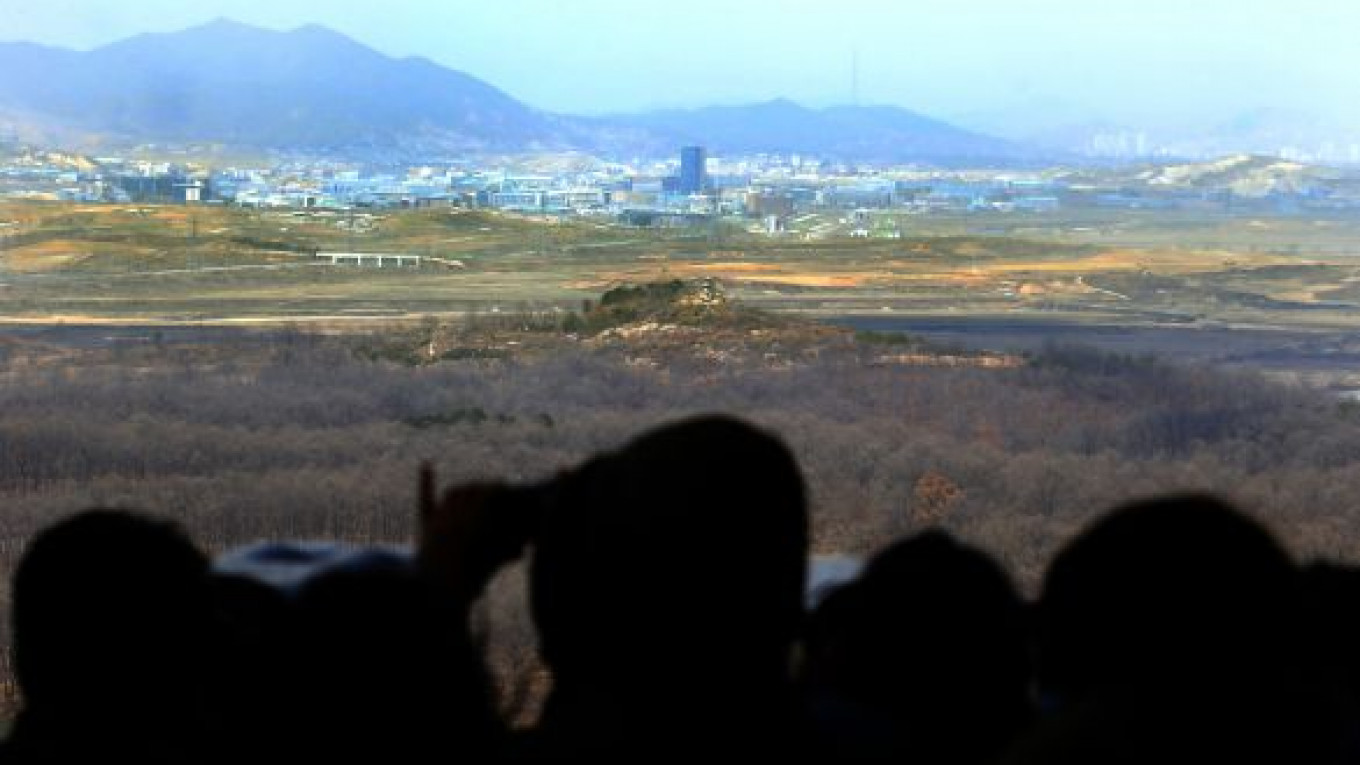The White House has urged Moscow to do more to restrain saber-rattling North Korea, but despite historically strong ties with its nuclear-armed neighbor, Russia does not have special influence that could help defuse growing tensions on the Korean Peninsula, experts Tuesday.
"Russia doesn't have any exclusive ways to influence North Korea," Fyodor Lukyanov, editor of Russia in Global Affairs, said by telephone on Tuesday.
Unlike China, by far North Korea's most significant military and economic partner, Russia's trade links with the insular state are negligible. They include North Korean logging camps in Siberia, a Soviet-era holdover that Western journalists have compared to the gulag.
Without economic influence over North Korea, with whom it shares a 19-kilometer border in the Russian Far East, Moscow must leverage traditionally warm relations with Pyongyang, said Leonid Kalashnikov, deputy chairman of the State Duma's International Affairs Committee.
Late North Korean leader Kim Jong Il was widely believed to have been born in the Soviet Union, which supported and inspired Pyongyang's Stalinist government, and Russia is one of the few countries he officially visited, including several months before he died of a stroke in December 2011. Likewise, Vladimir Putin chose North Korea for his first official trip as president in 2000.
But warm relations did not stop Russia from joining international condemnation over North Korea's third-known nuclear test in February, and it has long joined the United States, China and others in calling for Pyongyang to halt development of nuclear weapons and ballistic missiles.
Lacking the United States' military muscle and China's economic sway over Pyongyang, Russia has opted for the role of cool-headed peacemaker, urging all sides to show restraint and return to the stalled six-party talks. This applies to North Korea as well as South Korea and the United States, both of which it has threatened to attack.
Russia's task is to convince the United States and South Korea to move "non-stop" military exercises further from the heavily guarded border between the two Koreas, a move that would reduce the risk of provoking a war by accident, said Alexander Vorontsov, a Korea expert at the Russian Academy of Sciences, Rossia-1 on Friday.
"Russia's position hasn't changed: It's pointless to pressure North Korea because that will only make their behavior worse," Lukyanov said.
An armed conflict on the Korean Peninsula could spark a humanitarian and environmental crisis in Russia, Kalashnikov said, and the Kremlin has expressed alarm over increasingly bellicose rhetoric from both sides in recent days. On Monday, Putin warned that a conflict could cause more damage than the in 1986.
Experts also said that despite North Korea's provocative behavior, it was unlikely that Kim Jong Un, the country's young leader, would actually order an attack.
"I don't think North Korea is suicidal. It's neither a threat nor a bluff, but rather an attempt to spur all sides of the six-party talks to resume more active negotiations," Kalashnikov said.
Lukyanov said North Korean saber-rattling was an attempt to "scare away" potential external enemies. "North Korea is demonstrating its 'incredible fortitude' and readiness for everything," he said, adding that in this scenario, the country's leaders were closed-off to outside influence.
"In the current situation, nobody can influence North Korea, not even China," Lukyanov said. "They intend to play this game to the end, to raise tensions enough to show that they're serious and then bring them down again," he said.
In a signal that the situation had not yet reached the brink, the Foreign Ministry Tuesday that it had no plans to evacuate staff from Pyongyang, Interfax reported, despite the North Korean government's recent warning that it could no longer guarantee the safety of foreign .
Moscow thinks that this is part of a "big bluff," and that North Korea will relax after a little while, Lukyanov said.
But in an ominous escalation, North Korea on Tuesday warned foreigners and tourists to leave South Korea, saying the two sides were "inching closer to a thermonuclear war," The Associated Press reported, citing a statement by the North Korean Asia-Pacific Peace Committee.
Contact the author at j.earle@imedia.ru
Related articles:
A Message from The Moscow Times:
Dear readers,
We are facing unprecedented challenges. Russia's Prosecutor General's Office has designated The Moscow Times as an "undesirable" organization, criminalizing our work and putting our staff at risk of prosecution. This follows our earlier unjust labeling as a "foreign agent."
These actions are direct attempts to silence independent journalism in Russia. The authorities claim our work "discredits the decisions of the Russian leadership." We see things differently: we strive to provide accurate, unbiased reporting on Russia.
We, the journalists of The Moscow Times, refuse to be silenced. But to continue our work, we need your help.
Your support, no matter how small, makes a world of difference. If you can, please support us monthly starting from just $2. It's quick to set up, and every contribution makes a significant impact.
By supporting The Moscow Times, you're defending open, independent journalism in the face of repression. Thank you for standing with us.
Remind me later.






